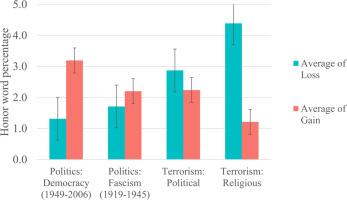作为极端意识形态修辞的意义丧失:来自政治和恐怖语境的证据
IF 2.2
Current research in ecological and social psychology
Pub Date : 2025-01-01
DOI:10.1016/j.cresp.2025.100225
引用次数: 0
摘要
借鉴意义探索理论(Kruglanski et al., 2022),我们在词频文本分析(Pennebaker et al., 2007)中使用了荣誉词典(Gelfand et al., 2015)来研究极端修辞。因此,我们进行了两项研究。第一,调查政治背景,比较法西斯独裁者贝尼托·墨索里尼(1918-1945,N = 284)和意大利共和国民主总统(1949-2006,N = 901)的演讲。第二项研究关注的是独行恐怖分子,研究了极端主义宣言数据库(EMD, Grigoryan et al., 2023)中的文本,并比较了受政治意识形态(left &;右翼分子、民族主义者和反政府分子(N = 65),以及受宗教意识形态驱使的恐怖分子(N = 23)。值得注意的是,我们假设并发现,与民主修辞相比,法西斯修辞包含(a)更多表达失去荣誉的词语,(b)更少反映获得荣誉的词语。此外,正如预期的那样,我们发现,与政治恐怖分子相比,独行侠宗教恐怖分子的修辞中表达失去荣誉的词汇更多,表达荣誉获得的词汇更少。值得注意的是,这是第一次使用《荣誉词典》从语言学上衡量意义需求的激活,证明了它与极端意识形态的支持有很强的相关性。此外,我们的研究支持极端修辞反映并旨在诱发意义丧失情绪的假设。本文章由计算机程序翻译,如有差异,请以英文原文为准。

Significance loss as the rhetoric of extreme ideologies: Evidence from the political and the terroristic context
Drawing on the Significance Quest Theory (Kruglanski et al., 2022), we used the Honor Dictionary (Gelfand et al., 2015) in a word frequency textual analysis (Pennebaker et al., 2007) to investigate extreme rhetoric. We thus conducted two studies. The first, investigating the political context, compared speeches of fascist dictator Benito Mussolini (1918–1945, N = 284) with those of democratic Presidents of the Italian Republic (1949–2006, N = 901). The second, focused on lone-actors terrorists, examined texts from the Extremist Manifesto Database (EMD, Grigoryan et al., 2023) and compared writings by terrorists driven by political ideologies (left & right-wing, ethno-nationalists, and anti-government, N = 65) with those of terrorists motivated by religious ideologies (N = 23). Notably, we hypothesized and found that, compared to democratic rhetoric, fascist rhetoric contained (a) more words expressing feelings of lost honor and (b) fewer words reflecting gaining honor. Moreover, as expected, we found that lone-actor religious terrorists' rhetoric, compared to lone-actor political terrorists, contained more words expressing feelings of lost honor and fewer words expressing honor gain. Notably, this is the first research to use the Honor Dictionary to linguistically measure the activation of the need for significance, demonstrating a strong correlation with the endorsement of extreme ideologies. Further, our research supports the hypothesis that extreme rhetoric reflects–and aims to induce–significance loss feelings.
求助全文
通过发布文献求助,成功后即可免费获取论文全文。
去求助
来源期刊

Current research in ecological and social psychology
Social Psychology
CiteScore
1.70
自引率
0.00%
发文量
0
审稿时长
140 days
 求助内容:
求助内容: 应助结果提醒方式:
应助结果提醒方式:


